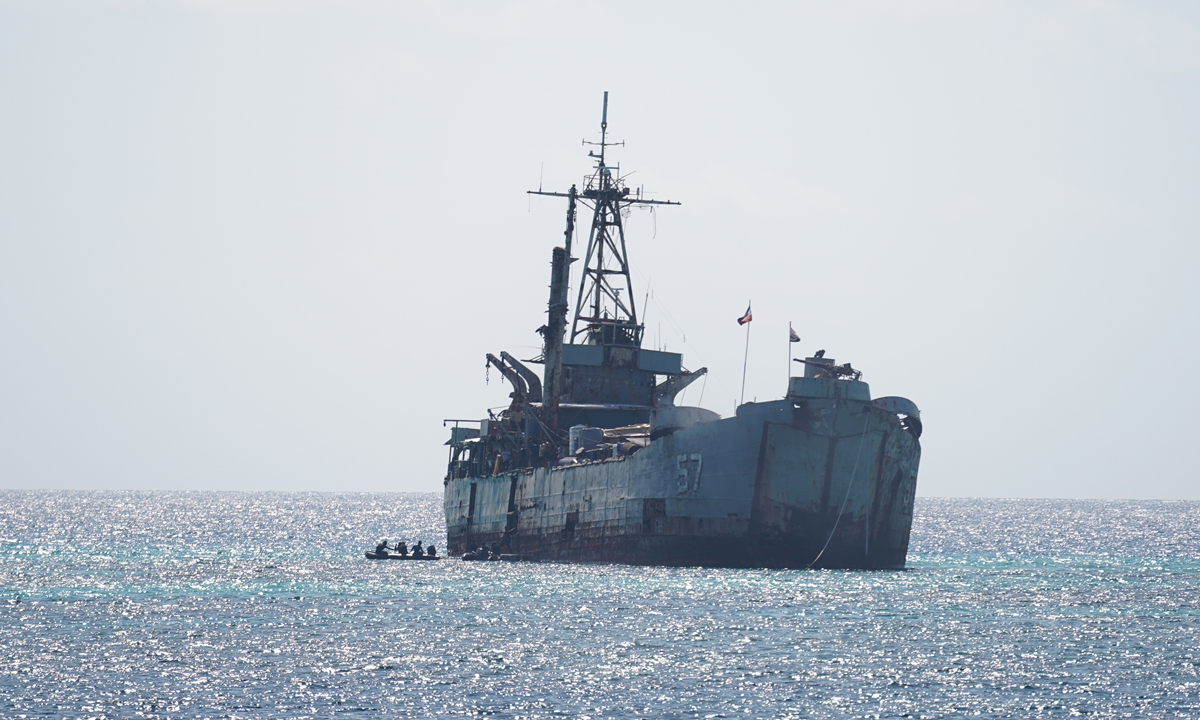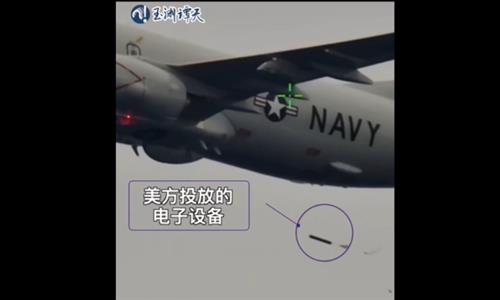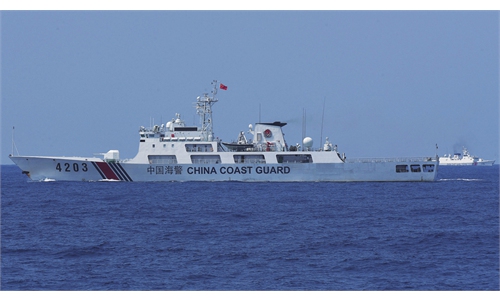Philippine grounded vessel damages corals and marine organism in S.China Sea while Philippines disrupts survey

The Philippines illegally grounded warship BRP Sierra Madre (LT-57) sent inflatable vessel to interfere with China's scientific investigation at close distance. Photo: Courtesy of South China Sea Ecological Center of China's Ministry of Natural Resources
The Philippine military vessel that illegally grounded at the lagoon slope of China's Ren'ai Jiao (also known as Ren'ai Reef) in the South China Sea since 1999 has seriously damaged the diversity, stability and sustainability of the coral reef ecosystem in the area, according to a scientific report released on Monday.
However, the process of collecting these evidences was disrupted by interference from the Philippine side.
Based on remote sensing and field investigation, the survey revealed a significant decrease in the distribution of scleractinia coral on the reef flat and lagoon slope within Ren'ai Jiao. This decline was particularly evident in the vicinity where the Philippines' military vessel was illegally grounded, resulting in the discovery of numerous sections of dead coral.
Heavy metals, dissolved inorganic phosphorus, and oils, as well as anthropogenic waste such as fishing nets were also widely collected around the vessel, which, according to experts, have had a long-lasting detrimental impact on the coral health.
The Global Times learnt from the frontline researchers that China's scientific research team was interfered by the Philippine side while investigating the marine ecosystem Sea in waters off Ren'ai Jiao.
Researchers recalled that at 9:10 am on April 21, when Chinese researchers deployed four research vessels at the site, the Philippines illegally grounded warship BRP Sierra Madre (LT-57) quickly sent two inflatable vessels to interfere with China's scientific investigation at close distance.
Then the Philippine vessels were cruising around, conducting dangerous maneuvers, in attempts to stop the Chinese researchers' scientific work.
The Philippine vessels were following and repeatedly interfering with the work of the Chinese research vessels through underwater surveillance and filming of the Chinese crew.
The close standoff between the two sides continued for an extended period of time, until Chinese research divers safely returned to their vessels.
Xiong Xiaofei, a senior engineer at the South China Sea Ecological Center, Ministry of Natural Resources, who went to the site to investigate, told the Global Times that it felt "shocking and heartbreaking" seeing such unprecedently massive and serious damage of coral reefs.
After thorough analysis, researchers ruled out natural causes such as strong typhoons for the damage and degradation of the coral reef ecosystem within Ren'ai Jiao, making sure that grounded military vessel and related human activities are the primary reasons, according to researchers at the report launching press meeting on Monday.
Li Tuanjie, the director of South China Sea Ecological Center, Ministry of Natural Resources, told the Global Times that the satellite remote sensing survey and field investigations used in this study are the mainstream technical methods for international ecosystem surveys.
"We have conducted satellite remote sensing surveys of coral reefs in the Xisha and Nansha islands for many years, and have also established a spectral database of coral reefs in the Nansha Islands through on-site spectral measurements. This complete technical method has been identified as reaching the international advanced level," Li said.
The monitoring of coral reefs in the South China Sea will be further expanded and normalized, according to the research team.




